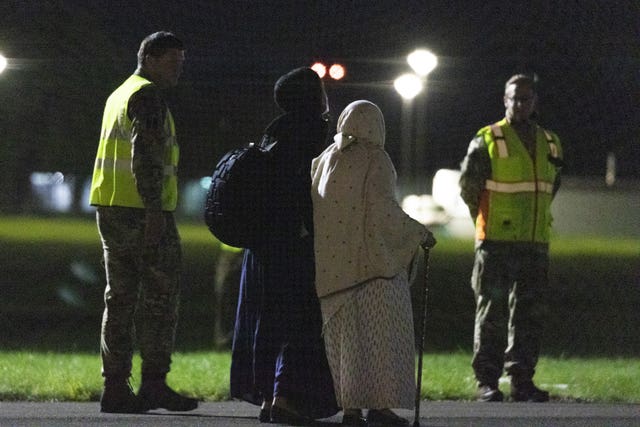
The evacuation effort in Afghanistan is growing increasingly desperate as terrorism fears at Kabul airport grow and the deadline for troops to leave the country approaches.
The Foreign, Commonwealth and Development Office (FCDO) warned of an “ongoing and high threat of terrorist attack” at Hamid Karzai International Airport on Wednesday night, as officials told UK nationals near the airport to leave and find a place of safety.
Eligible Afghans hoping to seek asylum in the UK would be better off now heading for Afghanistan’s border and trying to make their way to a third country, the Defence Secretary was reported to have told MPs.
Crowding has been a challenge for troops to manage as they attempted to evacuate as many people as possible.
But, now, an attack is feared, prompting instructions to stay away from the airport.
The Guardian reported that the concerns surrounded so-called Islamic State splinter cell, Isis-K, an enemy of the Taliban.

On Sunday, US President Joe Biden’s national security adviser Jake Sullivan said the threat from the group at the airport was “real, acute” and “persistent”.
Defence Secretary Ben Wallace held a briefing with MPs on Wednesday, where he is reported to have said it would be a “better option” for those who still need to leave the country to travel across the border.
The Government has previously said it will increase diplomatic support in neighbouring countries to process refugees who escape from Afghanistan.
On Wednesday, a British Army medic spoke of the situation at the airport.
Lieutenant Colonel Benjamin Caesar, a trauma and orthopaedic surgeon from 16 Medical Regiment, Royal Army Medical Corps, has been based at Kabul airport and had treated gunshot injuries, flashbang injuries, and people who have been crushed in the crowd.
“There have also been an unexpectedly high number of children being passed to us and being dealt with by the hospital,” Lt Col Caesar said.

Viral images have shown babies and young children being handed over to troops by desperate parents, often over walls topped with barbed wire.
Lt Col Caesar said: “The numbers of people coming through went probably much higher than we anticipated, I don’t think anyone foresaw the crushing sea of humanity at the gate and how they were going to be affected by the situation.”
The warning to stay away from Kabul airport is a change in tone from a week ago when Boris Johnson said the situation had been stabilising.
Latest figures from the Ministry of Defence (MoD) showed that 11,474 people had been able to leave the country since the evacuation mission Operation Pitting began on August 13.
This includes embassy staff, British nationals, those eligible under the Afghan relocation and assistance policy (Arap) programme, as well as some evacuees from allied countries.
But the end of the operation is rapidly approaching after US President Joe Biden rejected calls from Boris Johnson and other allies to delay his August 31 withdrawal date for the remaining US troops, who are providing security at Kabul airport.
Nearly 2,000 Afghan interpreters and other staff who worked for Britain still need to be evacuated from Afghanistan.
They have been assessed as eligible under the Afghan relocations and assistance policy (Arap) and have passed security checks but remain on the ground, the PA news agency understands.
An unidentified number of “special cases” may also be eligible for evacuation, such as LGBTQ advocates, judges and human rights activists.
The MoD said the UK has evacuated almost 7,000 Afghan individuals and their families so far.
The number of British citizens who still need evacuation, as well as those who hold dual citizenship, also remained unclear.
In Kabul tonight, British soldiers, diplomats and staff remain at their posts moving heaven and earth to get as many people to safety as they possibly can. This is what courage looks like. Thank you to each and every one of you. https://t.co/WydyvhS5CX
— Lisa Nandy (@lisanandy) August 25, 2021
A timetable for British troops to halt evacuations and begin their own exit has not been set out but is likely to come ahead of the departure of their US counterparts.


Comments: Our rules
We want our comments to be a lively and valuable part of our community - a place where readers can debate and engage with the most important local issues. The ability to comment on our stories is a privilege, not a right, however, and that privilege may be withdrawn if it is abused or misused.
Please report any comments that break our rules.
Read the rules hereLast Updated:
Report this comment Cancel